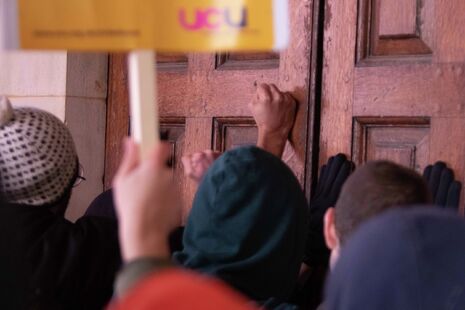Revealed: Trinity plans exit from national pension scheme, isolating college from higher education sector
Documents leaked to Varsity show the college has estimated it will cost £30m to withdraw from USS, pending the fellowship’s approval

For two months this year, staff at universities nationwide went on strike to protest cuts to their pensions. Throughout the dispute, staff voiced their sense of mistrust in employers, and feelings which had been mounting for a decade that they were being overlooked.
Varsity revealed in June that the University of Cambridge had seriously considered leaving the national pensions scheme, a move widely seen as marking a betrayal of the higher education sector. In meeting minutes leaked to Varsity, University officials were shown to have noted the move “might be seen, wrongly, as part of a plan to wreck the [scheme] rather than a last resort.”
Now, Varsity can reveal that Trinity College Council is planning to leave the national scheme – a proposal which senior administrators have been exploring since March 2017.
Leaked documents from Trinity’s Council meetings and confidential reports showed the college has estimated it will cost £30m to withdraw from the national pensions scheme, the Universities Superannuation Scheme (USS), which it aims to do by 1st March 2019 at the earliest.
For fellows joining the college after it withdraws from USS, benefits could be moved to a defined contributions arrangement – thought of as placing staff in greater financial instability. When employers proposed a national shift to defined contributions last year, it sparked the staff strikes.
“External perception should not be a reason to stop the College doing the right thing”
College officials called the plans ‘Project Bronze’. Reports showed the issue at the centre of the proposals was officials’ fear of what they called an unlikely but existential risk of financially insecure higher education institutions collapsing. The nature of the national pensions scheme entails that in that scenario, the college would be forced to prop them up.
Officials described concerns about the public perception of these proposals. In a report marked confidential, the college’s senior bursar noted: “ … any decision by the College to leave may well attract (negative) publicity and leave the College’s decision open to misinterpretation by anyone with an axe to grind in any debate or discussion.”
Administrators added, however: “external perception should not be a reason to stop the College doing the right thing.”
CONFIDENTIAL SENIOR BURSAR’S REPORT
❝ Any decision by the College to leave may well attract (negative) publicity and leave the College’s decision open to misinterpretation by anyone with an axe to grindin any debate or discussion. ❞
The College Council decided by eight votes to one to put forth the proposals to the college’s fellows in a formal consultation mandated by Trinity’s democratic procedures.
In the last week of Michaelmas, the proposals were brought to the college fellowship. Yet the consultation, expected to last until January, has been described as ill-timed and inadequate.
The unlikely but ‘existential’ risk driving Project Bronze
A confidential report from Trinity’s senior bursar said: “The reason for the proposed change is to take control of our own pension arrangements. The catalyst is to protect the College from the last man standing risk inherent in USS.”
The last man standing risk refers to the fact that USS operates under a last man standing scheme. Under the scheme rules, the liabilities of universities which become insolvent are passed to the last employer in the scheme.
The risk, they claim, stems from a hypothetical scenario in which the higher education sector collapses financially, with only members such as Trinity in a healthier position having to take on others’ liabilities in the scheme.
Another report claimed the situation was “very unlikely” and that they “do not expect it to happen at any time.” It explained that by withdrawing from the scheme, “the College is insuring against an event that it does not expect to occur in order to remove a remote existential risk to the College’s balance sheet.”
Reports also raised issues with USS governance and the nature of the scheme, where less wealthy institutions benefit from being part of the scheme in a way that wealthier institutions like Trinity do not.
One report stated: In USS, “[e]mployers individually have an underlying incentive to game USS and free ride on the other employers. There is no insinuation of bad faith, but it is inevitable that participants will instinctively look after their own interests.”
CONFIDENTIAL SENIOR BURSAR’S REPORT
❝ USS is a mutual scheme. Employers individually have an underlying incentive to game USS and free ride on the other employers. There is no insinuation of bad faith, but it is inevitable that participants will instinctively look after their own interests. ❞
A spokesperson for Trinity said in a statement: “Trinity College is reviewing pension arrangements for its academics. Consultation with Fellows is underway and any decisions will be taken after the completion of this process.”
A fellow from the college who wished to remain anonymous commented on the proposals: “[The college] needs to be part of the conversation about where the sector is going and what it is to be a student – now more than ever.
“Trinity will only render itself irrelevant with an expensive and unnecessary statement of conspicuous consumption.”
“Trinity will only render itself irrelevant with an expensive and unnecessary statement of conspicuous consumption”
Leaked meeting minutes from October 2017 between Cambridge’s central finance officials showed similar fears about the last man standing scenario: “if the position could be secured that the University were no longer responsible for underwriting the USS as ‘last man standing’, it could establish its own scheme tailored to its employees’ needs and risk appetite.”
The fellow added: “I think that Trinity only functions and is successful as one element of UK higher education, and to begin to remove itself from that community and that system would be a terrible failure of both common sense and responsibility.”
A spokesperson from USS commented that Trinity’s withdrawal would have “no material impact on the scheme’s overall funding position or membership.”
CONFIDENTIAL SENIOR BURSAR’S REPORT
❝ [In a last man standing scenario with Trinity operating outside of USS, the college] would also bea safe refuge for donorswho wished the College to transfer support elsewhere in the Collegiate University. ❞
When considering the public perception of the proposals, the senior bursar’s report noted that withdrawing from the scheme would mean that in a last man standing scenario, “the College would be able to maintain its support to Collegiate Cambridge at a time of even greater need.”
The report also claimed: “It would also be a safe refuge for donors who wished the College to transfer support elsewhere in the Collegiate University.”
What next for Trinity fellows’ pensions?
Reports showed senior officials are exploring the setting up of two separate schemes for existing and future fellows, details of which remain unclear.

An advisory report recommended that Trinity aim to replicate benefits that existing fellows would have under USS.
For future fellows, the college has been considering a separate arrangement of defined contributions.
Before employers proposed a move to defined contributions, USS has functioned under a defined benefits system. Defined benefit schemes provide a guaranteed income upon retirement, whereas the value of defined contribution schemes depend on returns from underlying investments in the stock market.
The proposed shift was widely condemned, and seen as placing university staff and academics in significantly more financial instability. The national employees’ union for higher education, the Universities and College Union (UCU), cited analysis by actuarial consultants First Actuarial which stated that staff could be as much as £200,000 worse off than under defined contribution schemes.

One Trinity fellow said: “... it seems to me that the proposed changes threaten to adversely affect younger scholars. I see no guarantee that future members of the scheme will be given the much better option of defined benefits.”
Trinity at risk?
Amid the dispute, staff consistently voiced concerns with what has been seen as an overstating of risk on employers’ parts, and how much weight is given to the unlikely possibility of the last man standing scenario.
Since the dispute arose, employers’ conceptions of how much risk they are taking on has come under a series of questioning.
Last September, Cambridge and eight of its constituent colleges expressed their wish to take on a lower level of financial risk in funding employees’ pensions.
Yet an expert panel, which was set up when staff voted to suspend the strikes, announced in September they had found employers’ proposals had been based on shaky foundations. The panel said that factors in how the scheme’s valuation was carried out last year led to misleadingly “dampened perceptions” of the outlook of USS, and that university employers should bear higher risk in the pension scheme for at least the next three years. In late November, Cambridge declared its support for the findings.
Over the next two months, Trinity fellows will be briefed and consulted on the college’s proposal to leave the scheme. One fellow noted, however: “The consultation process has been inadequate, rushed, and ill-timed.”
“USS has agreed to a new valuation, undermining the whole basis of the notion of risk, and the current proposals offer no opportunity to take this into account.”
 News / Fitz students face ‘massive invasion of privacy’ over messy rooms23 April 2024
News / Fitz students face ‘massive invasion of privacy’ over messy rooms23 April 2024 News / Climate activists smash windows of Cambridge Energy Institute22 April 2024
News / Climate activists smash windows of Cambridge Energy Institute22 April 2024 News / Copycat don caught again19 April 2024
News / Copycat don caught again19 April 2024 News / Emmanuel College cuts ties with ‘race-realist’ fellow19 April 2024
News / Emmanuel College cuts ties with ‘race-realist’ fellow19 April 2024 Comment / Does Lucy Cavendish need a billionaire bailout?22 April 2024
Comment / Does Lucy Cavendish need a billionaire bailout?22 April 2024







